Queen Woo: Episodes 5-8 (Final)
by solstices
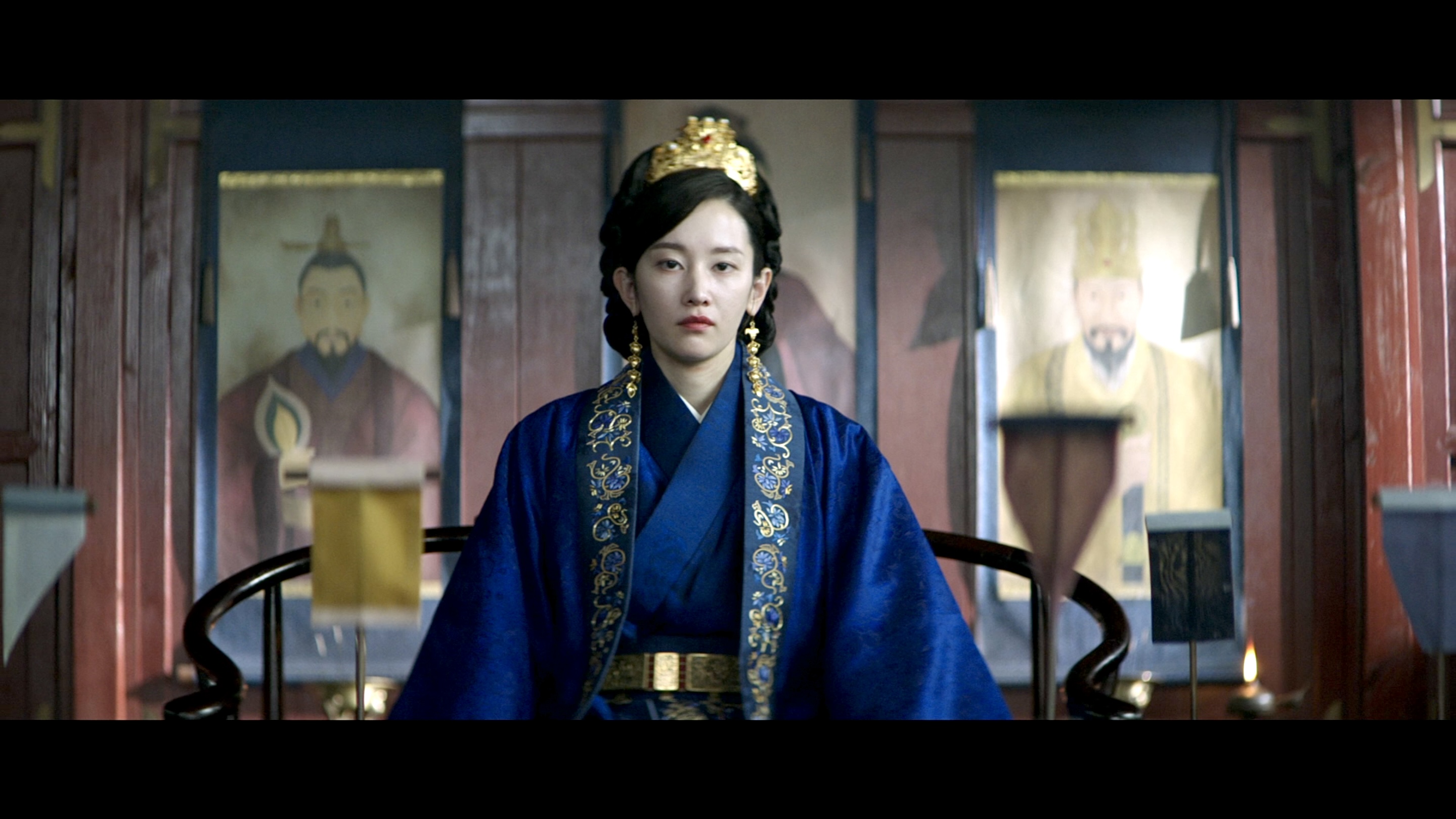
In a race against time, our titular queen rallies both knowledge and wit to recruit allies and counter her enemies. Queen Woo attempts to cobble together its disparate plot threads in its latter half, but its scattered narrative leaves viewers with barely more than a lackluster journey and an unsatisfying conclusion.
EPISODES 5-8
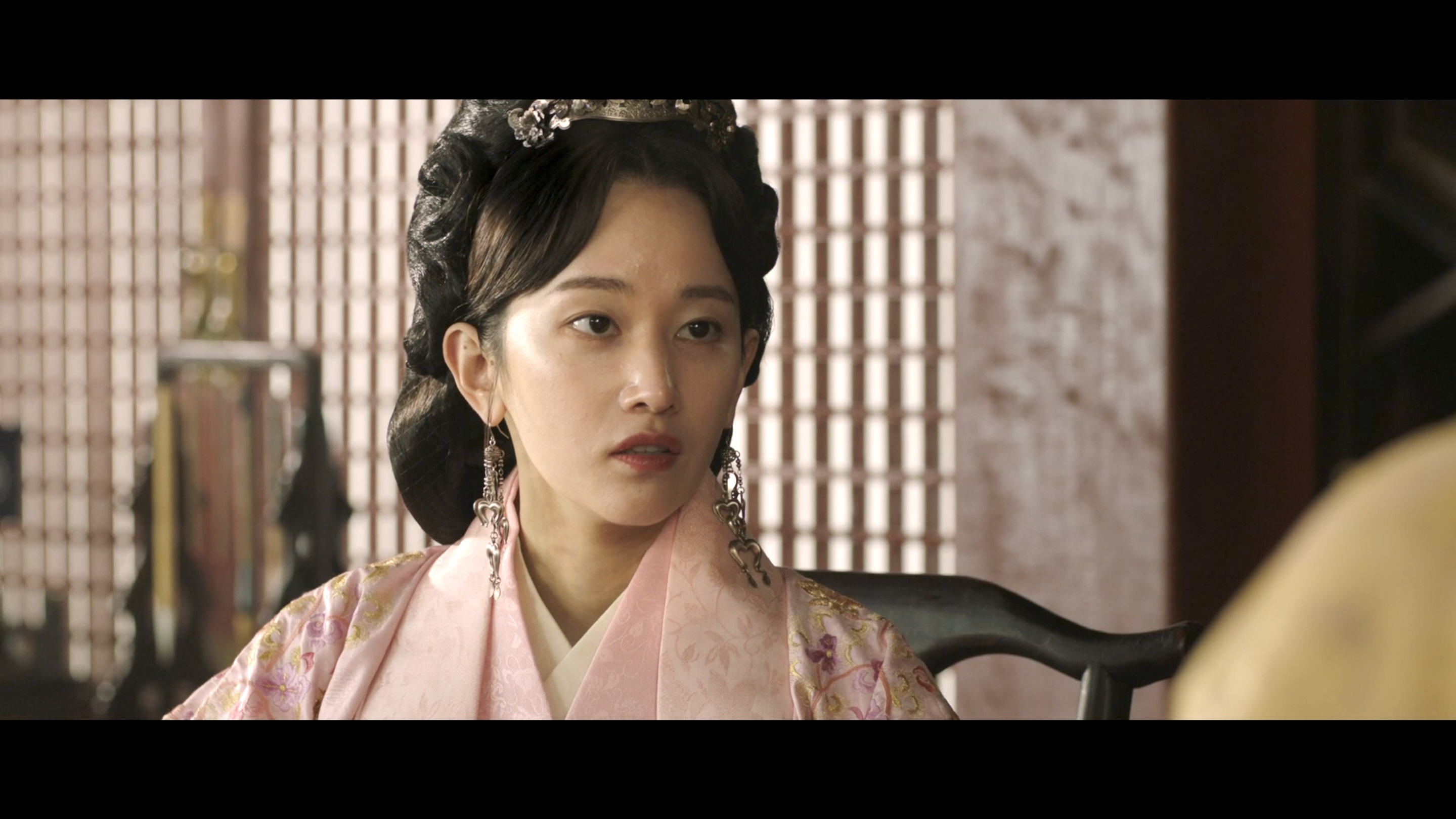
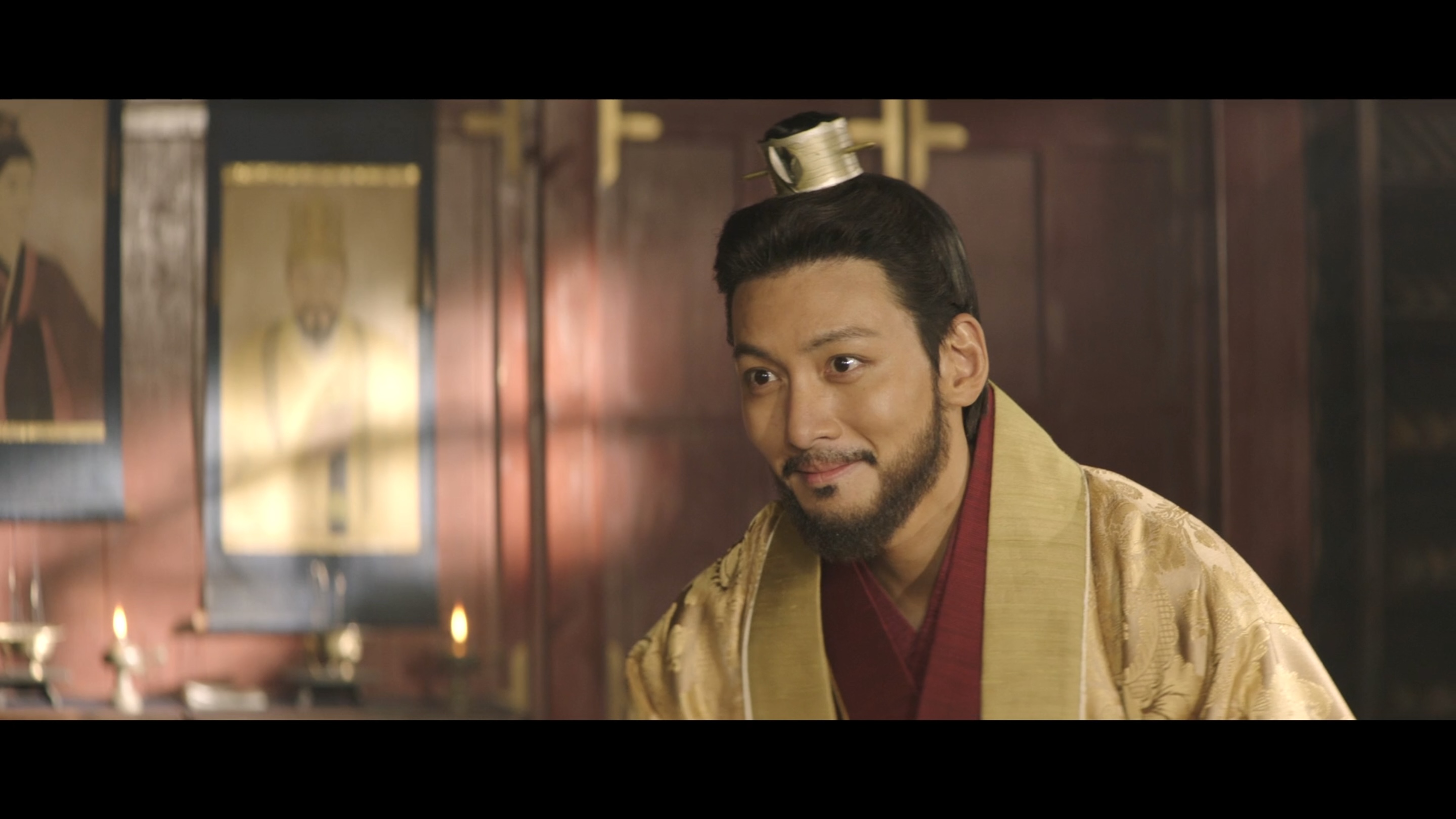
Leveraging on an anecdote Go Nam-mu once told her, Woo Hee directs her entourage towards the youngest prince Go Gye-soo’s territory — Ba’euitu, named for the bank of rocks that a wise general built and lured his enemies under. Upon Woo Hee’s order, Mu Gol cuts the ropes as they pass, and the rocks crumble down on the White Tiger hunters. Only Nwe-eum and a few others survive, while Nwe-eum’s son (Ahn Ji-ho) crumples under the rocks after Woo Hee shoots his horse. Hellbent on revenge, a grief-stricken Nwe-eum snarls that he’s no longer capturing the queen alive; he’ll kill her on sight.
Now that they’ve successfully distanced themselves from their pursuers, our party swerves away from the fifth prince. It turns out Woo Hee had only intended to use Ba’euitu as a means of dispatching their enemies — her true destination is the fourth prince Go Yeon-woo. He’s a vain manchild who covets the queen, and Woo Hee uses his vapid cotton-filled brain to her advantage. Deliberately playing into his lust by coyly tempting him, Woo Hee easily has the flustered fourth prince agreeing to a levirate marriage.
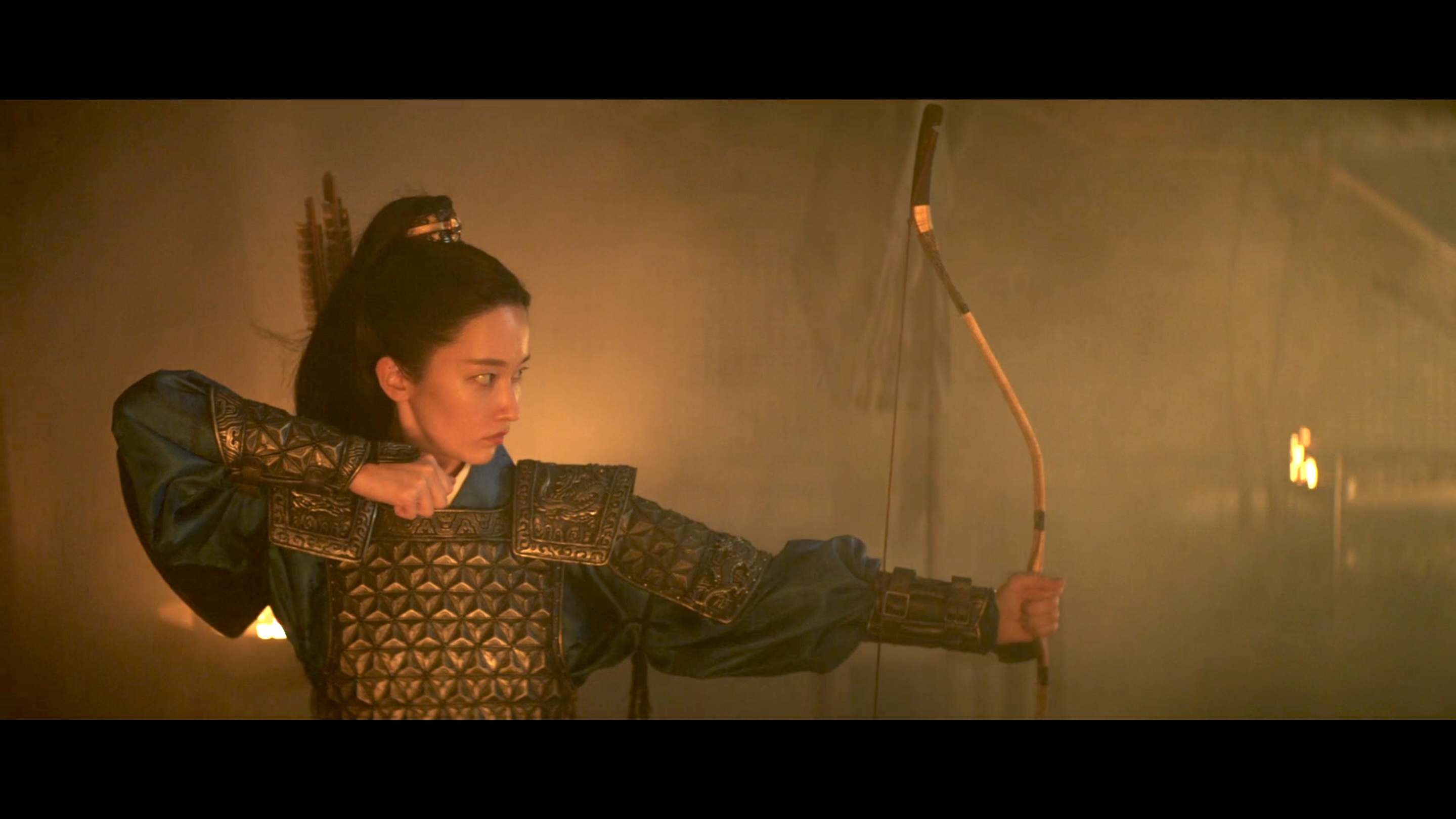
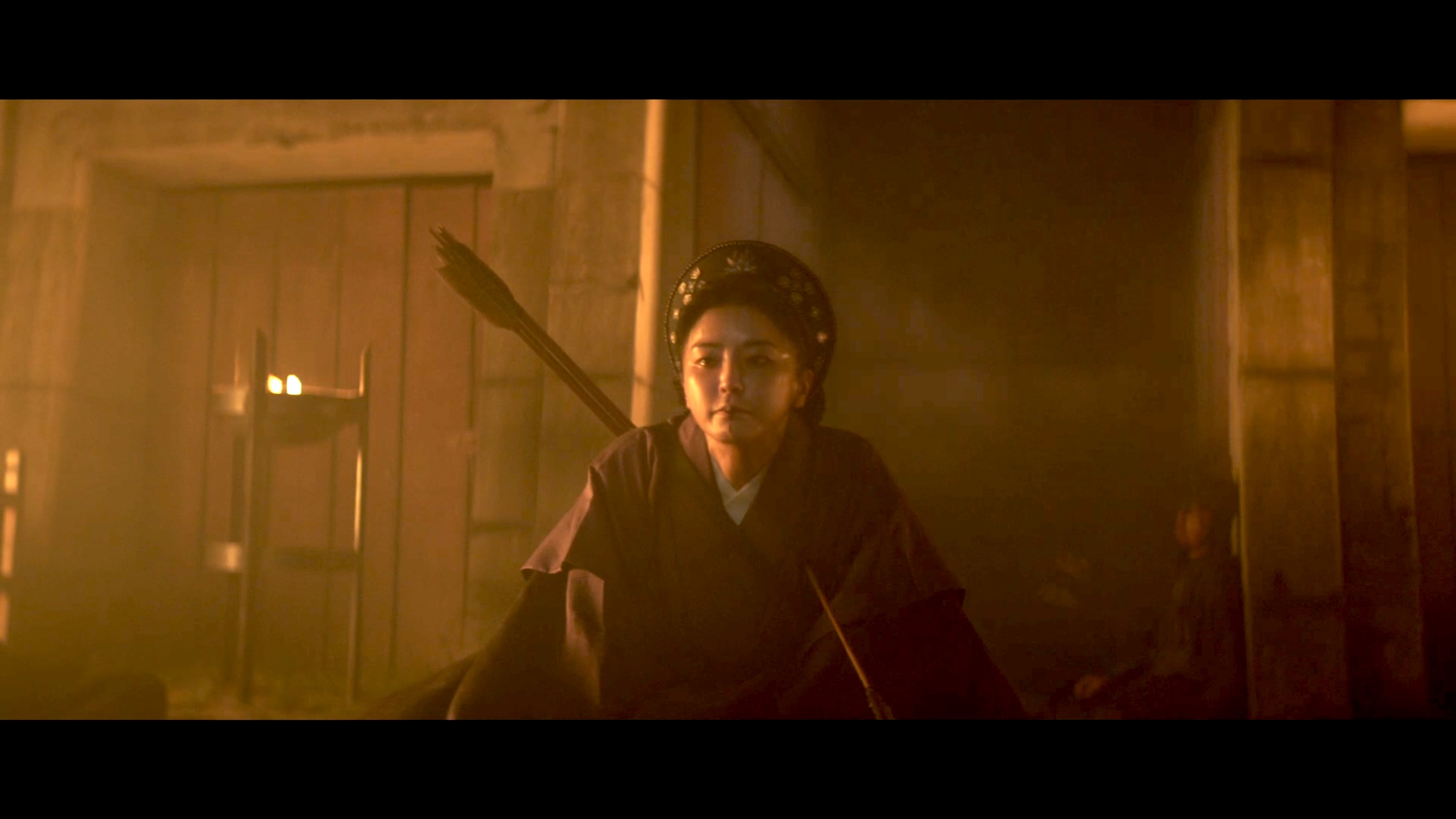
Our queen’s mind is sharper than any, and she quickly connects the dots of her sister’s betrayal. Not only had Woo Sun ratted them out to Go Bal-ki, but she’d also sunk even lower. Earlier, Woo Sun had torn a scrap of fabric off her skirt and left it behind for the hunters to follow — and when that hadn’t panned out, she’d deliberately stayed behind to strike a deal with Nwe-eum by offering to lead them to Woo Hee.
A flashback contextualizes Woo Sun’s obsession with the king, and wryly mirrors the way she’d been tricked by Sabi. Frustrated with the lack of a royal heir, the calculative and conniving family head Woo Do had sent Woo Sun to Go Nam-mu’s military camp. Through a drug-addled haze inflicted by Sabi, Go Nam-mu sees Woo Sun as his beloved Woo Hee, and she takes full advantage of that fact. The next morning, the king is simmering with a quiet fury as he dismisses Woo Sun, sparing her only on her sister’s account.
In the present, our queen leads her selfish sister into a trap, then confronts her about her betrayal. When Woo Sun whines that everything Woo Hee possesses now should have been hers, Woo Hee cuts right to the heart of the matter: Woo Sun always turns her nose up at things, then covets them once they become Woo Hee’s. Cornered, Woo Sun draws her bow against her own sister, and Woo Hee draws hers in turn. Both fire — and while Woo Sun’s arrow misses, Woo Hee’s finds its mark.
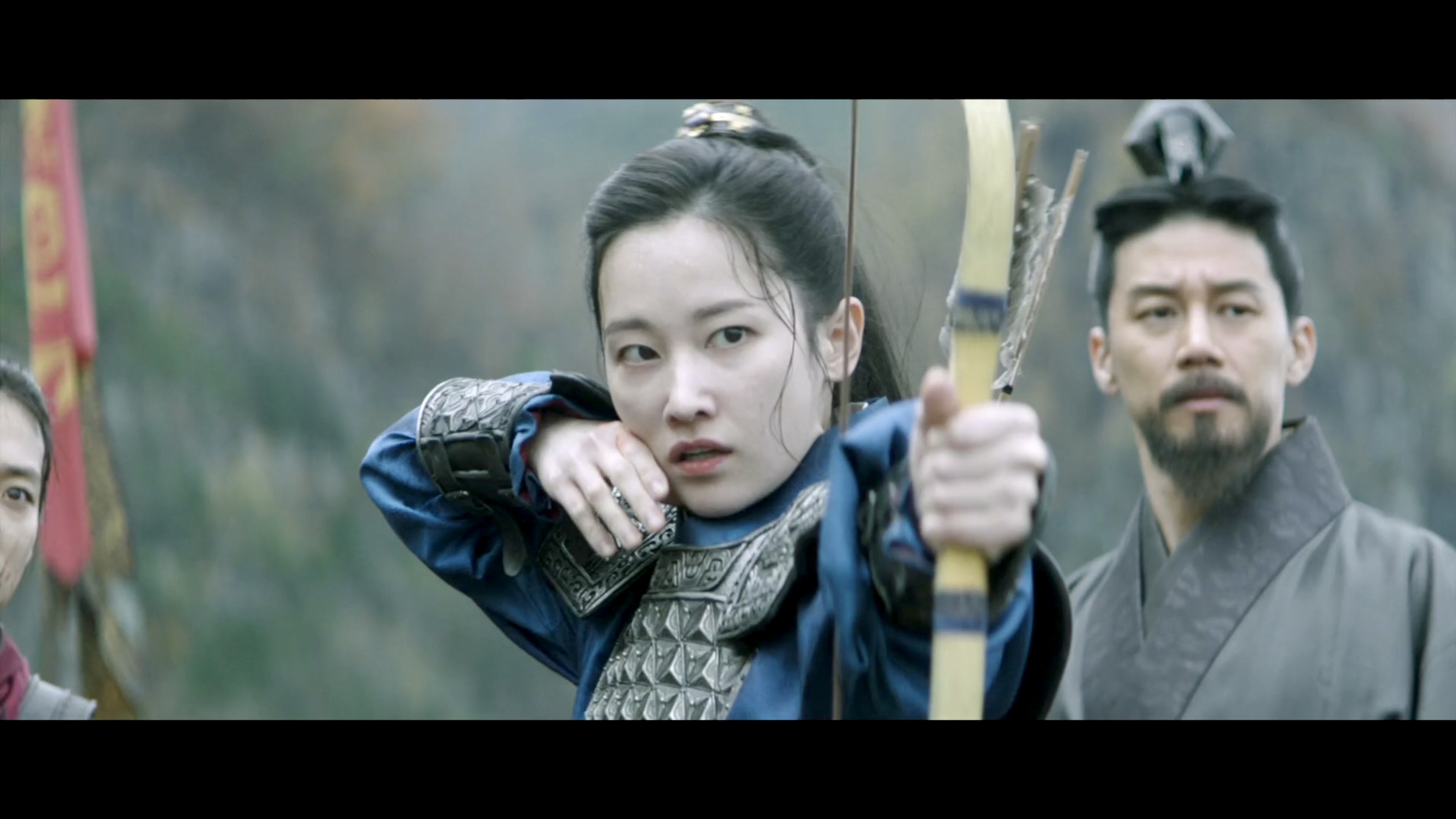
There’s no time to waste on mourning, though. (What a wasted opportunity to explore Woo Hee’s pragmatism and guilt! But I digress.) Woo Hee’s retinue must return to the palace before sunrise, despite the White Tiger hunters lying in wait. Banking on Eul Pa-so being on the same wavelength, Woo Hee trusts that he will understand her strategy — and indeed, he does. Just as they ride up to the ferry docks, a wave of arrows commanded by Eul Pa-so comes raining down on the hunters. Safe at last, our party sets sail for the palace.
Back in the royal court, Woo Hee informs the ministers of the king’s death, then claims that his dying wish had been for Go Yeon-woo to ascend the throne through levirate marriage. Not quite the truth, of course — but Go Nam-mu’s last words to Woo Hee had been for her to protect herself, so perhaps the sentiment does ring true. Ever the spoilsport, Go Bal-ki saunters in to voice his opposition (and hilariously, the timid Go Yeon-woo hides behind Woo Hee when Go Bal-ki draws his sword).
The court manages to turn the violent third prince away, but only temporarily. Go Bal-ki seeks the exiled crown prince Go Pae-eui out in Liaodong, inviting him to exact vengeance upon the late king by seizing the throne. Donning an ornate mask to conceal his disfigured nose, Go Pae-eui mobilizes his troops alongside Go Bal-ki’s mounted warriors. He will declare war on the palace.
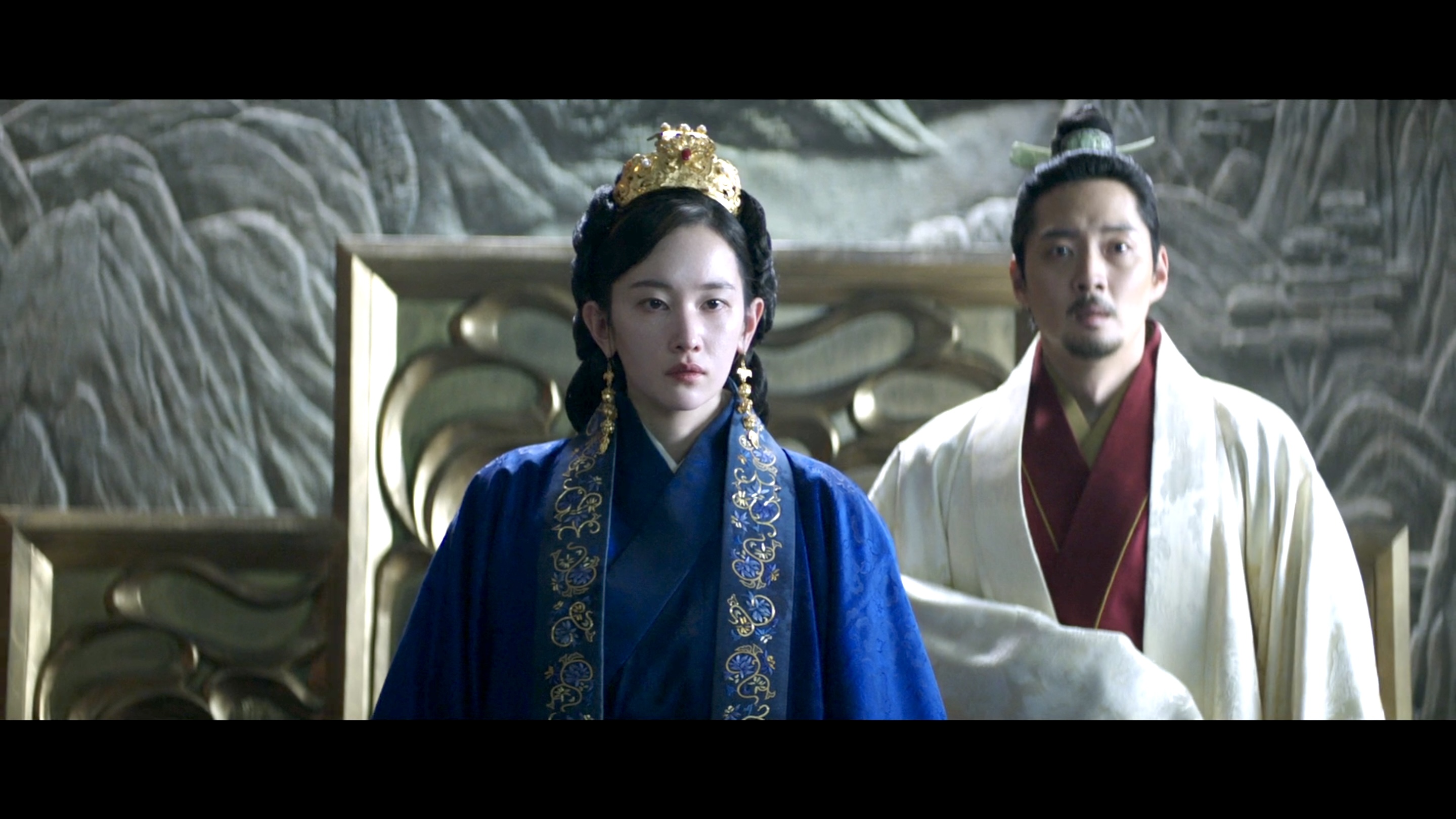
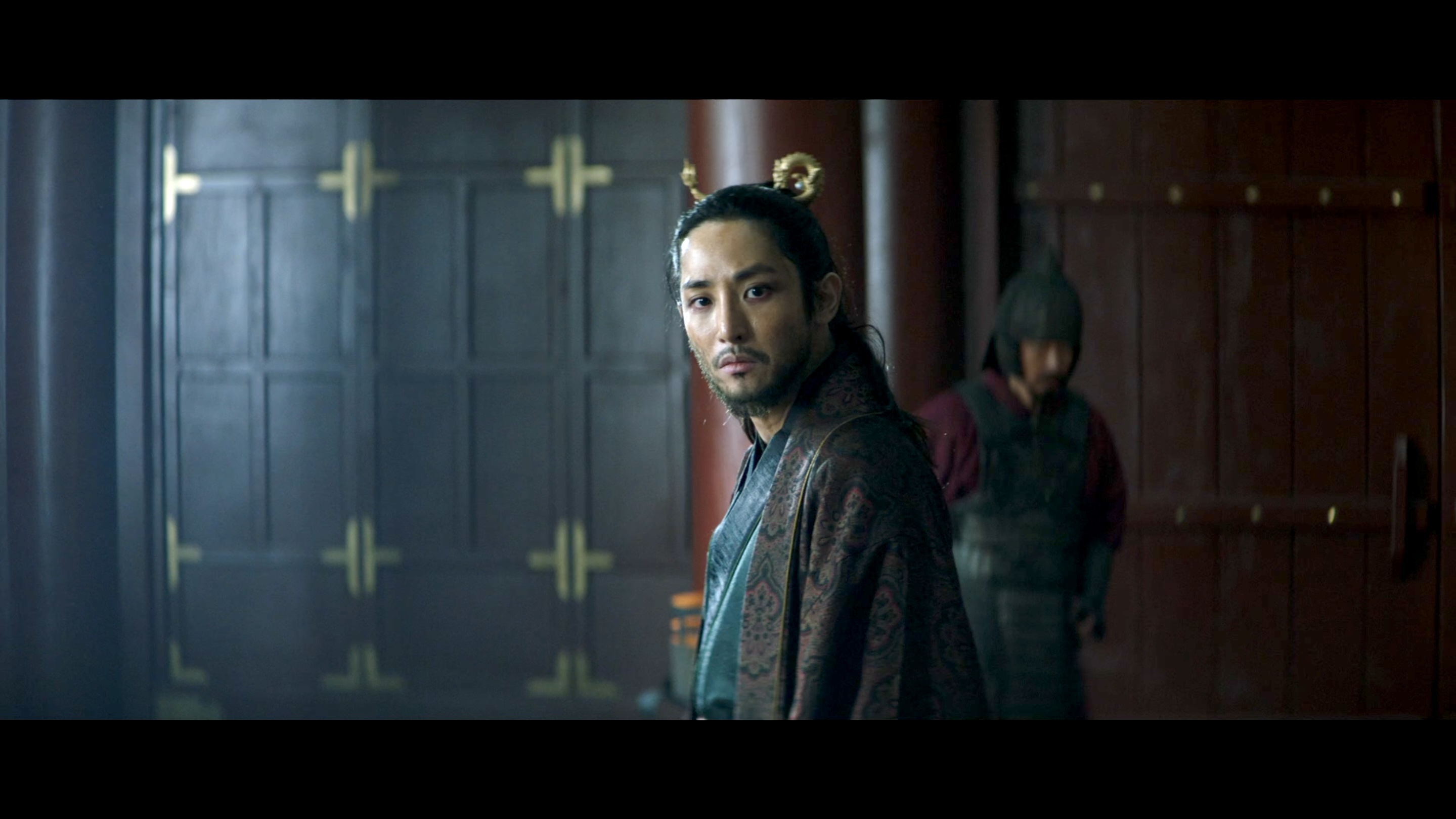
While Woo Hee was on her quest for a marriageable prince, Eul Pa-so has been furthering his investigation of the king’s poisoning. All traces seem to lead to Sabi, but when he attempts to take her into custody, they’re accosted by a horde of blade-wielding eunuchs. Amidst the chaos, one manages to stab Sabi. Alas, Sabi doesn’t manage to eke out anything useful before succumbing to her wound.
Eul Pa-so narrows down his suspicions to the head secretary Song Woo, who oversees the eunuchs, and a clever tactic of swapping two carrier pigeons indeed yields a confirmation. Song Woo’s secret letter ends up delivered to Eul Pa-so’s windowsill, serving irrefutable proof that Song Woo is the mole who’s been leaking information. But nothing quite points to the poisoning culprit just yet.
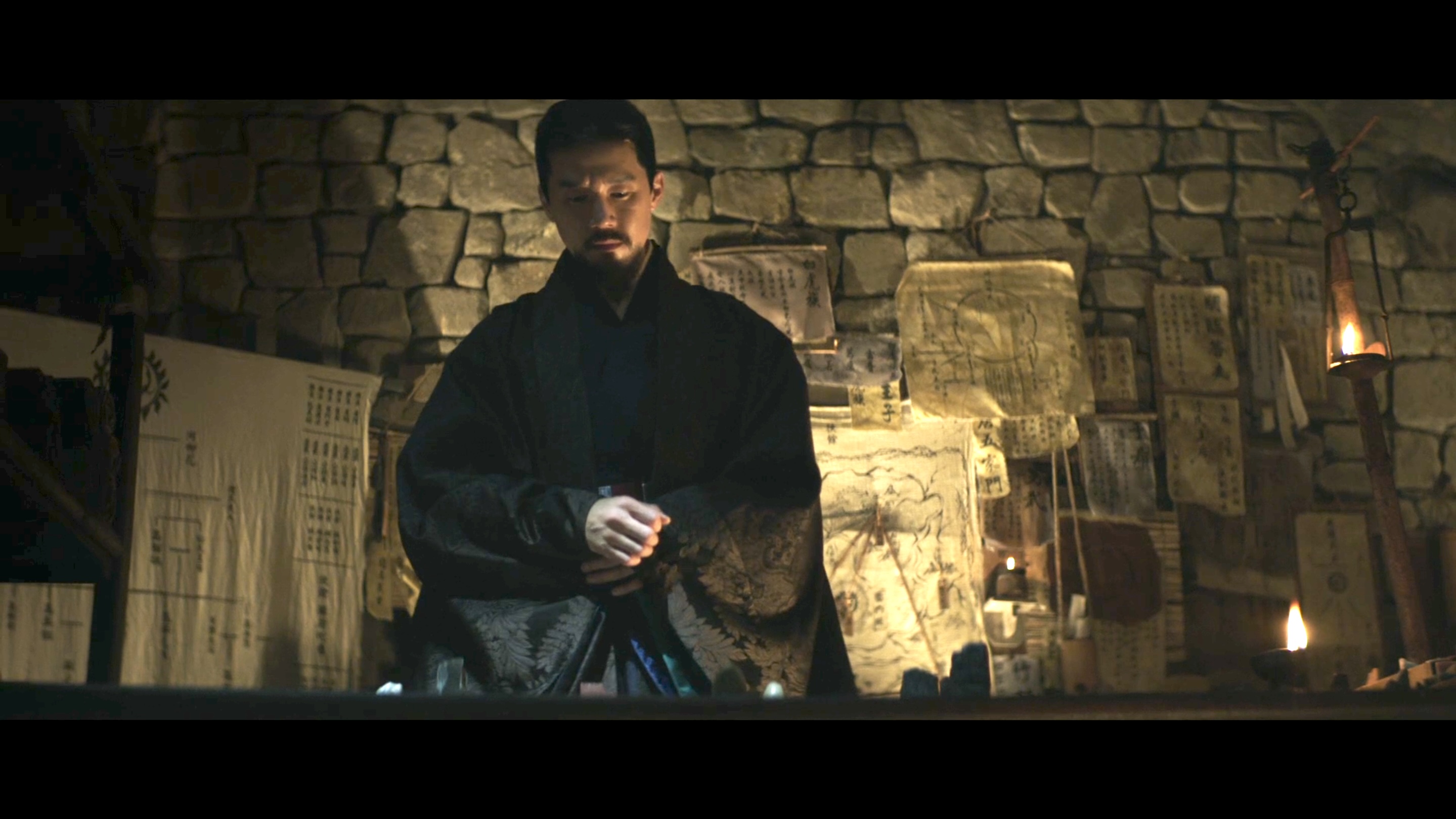
In the meantime, there’s much more to our prime minister than first meets the eye. Rewinding to the time a young Eul Pa-so accidentally stumbled upon his grandfather’s decayed corpse sitting in the archives, we learn that the Eul clan had once been the royal family of Juna. But King Taejo of Goguryeo — fearful of their brilliant minds — destroyed Juna, then crippled Eul Pa-so’s grandfather and left him to rot.
That was the impetus that catalyzed Eul Pa-so’s diligent studying, honing his razor-sharp intellect to avenge his clan. Since Jolbon blood runs in his veins too, he’d approached Yeon Bi on the pretext of reclaiming the stolen Jolbon land for her, asking for her military might in exchange. Eul Pa-so’s covert scheme is to incite a rebellion through Go Bal-ki — and if Go Nam-mu dies early, then a levirate marriage will spur the princes into a bloody fight for the throne. Which is exactly what things have come to.
For now, Eul Pa-so bides his time, observing from the sidelines. But Woo Hee is already several steps ahead, in more ways than one. To continue their interrupted chess game, she’d written no less than five subsequent moves beforehand, predicting all of Eul Pa-so’s moves right up to a checkmate in her favor. It’s an echo of their childhood chess match, asserting that Woo Hee is more than just a pawn on a board.
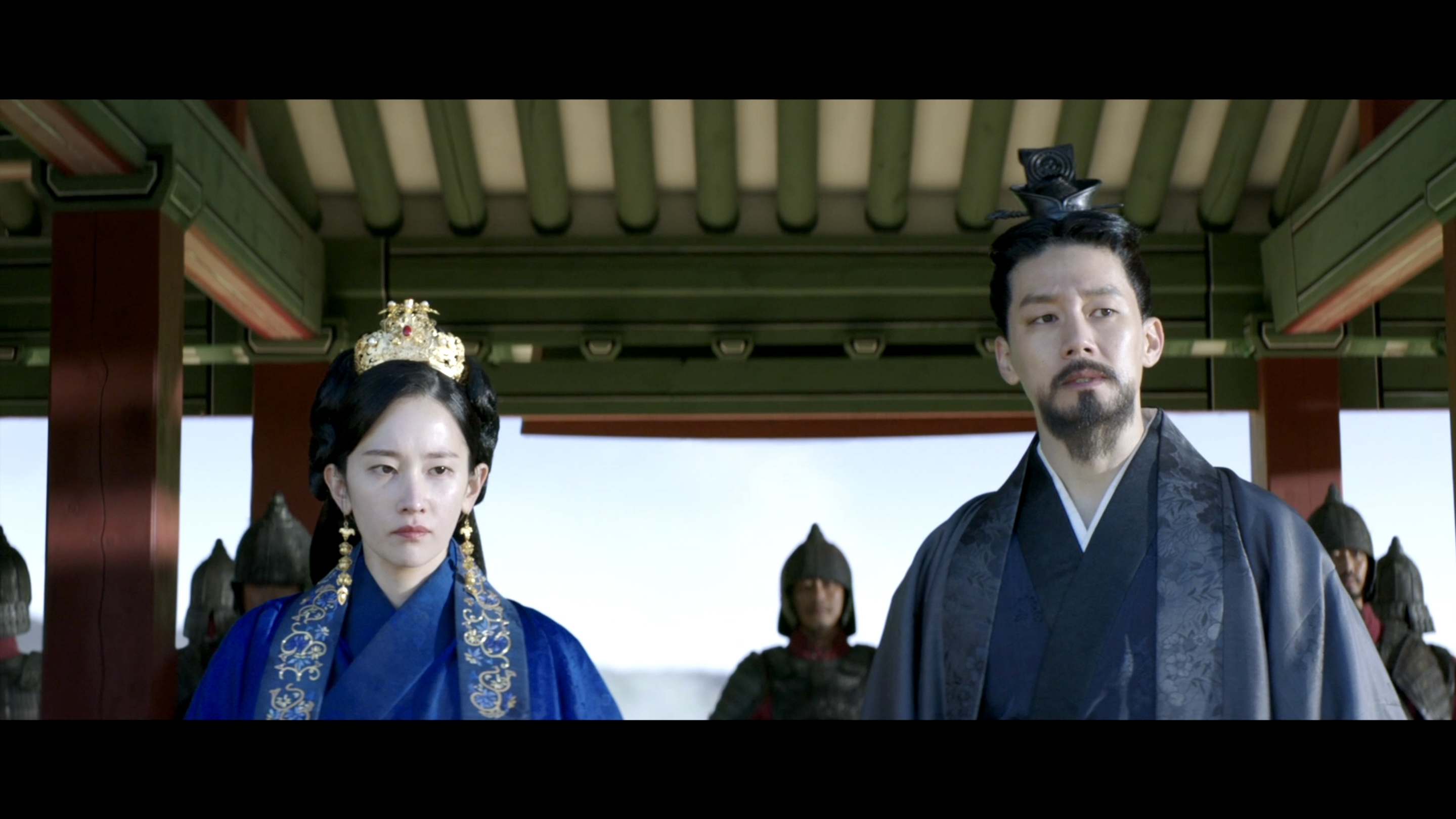
That analogy lies at the core of Woo Hee’s will — she will take charge of her own destiny by taking control of the board. “All the things I was told I could not do by virtue of being a woman — it is simply that I did not do them. Now, I will show you what I am capable of.” In the face of the imminent insurgence, Woo Hee seeks to reunite the five tribes that once swore an oath to the founding king Chumo. And her effort pays off.
Not only does Woo Hee’s deliberate choice to marry the feeble Go Yeon-woo earn her the Great Priest’s might, but she also obtains the support of the North faction. Alongside the faithful prince Go Gye-soo and his commitment to honoring Go Nam-mu, Woo Hee has amassed enough strength to defend the country against the approaching rebellion. Pulling on her armor, Woo Hee grasps her bow and arrows. She will fight alongside her people to defend her country.
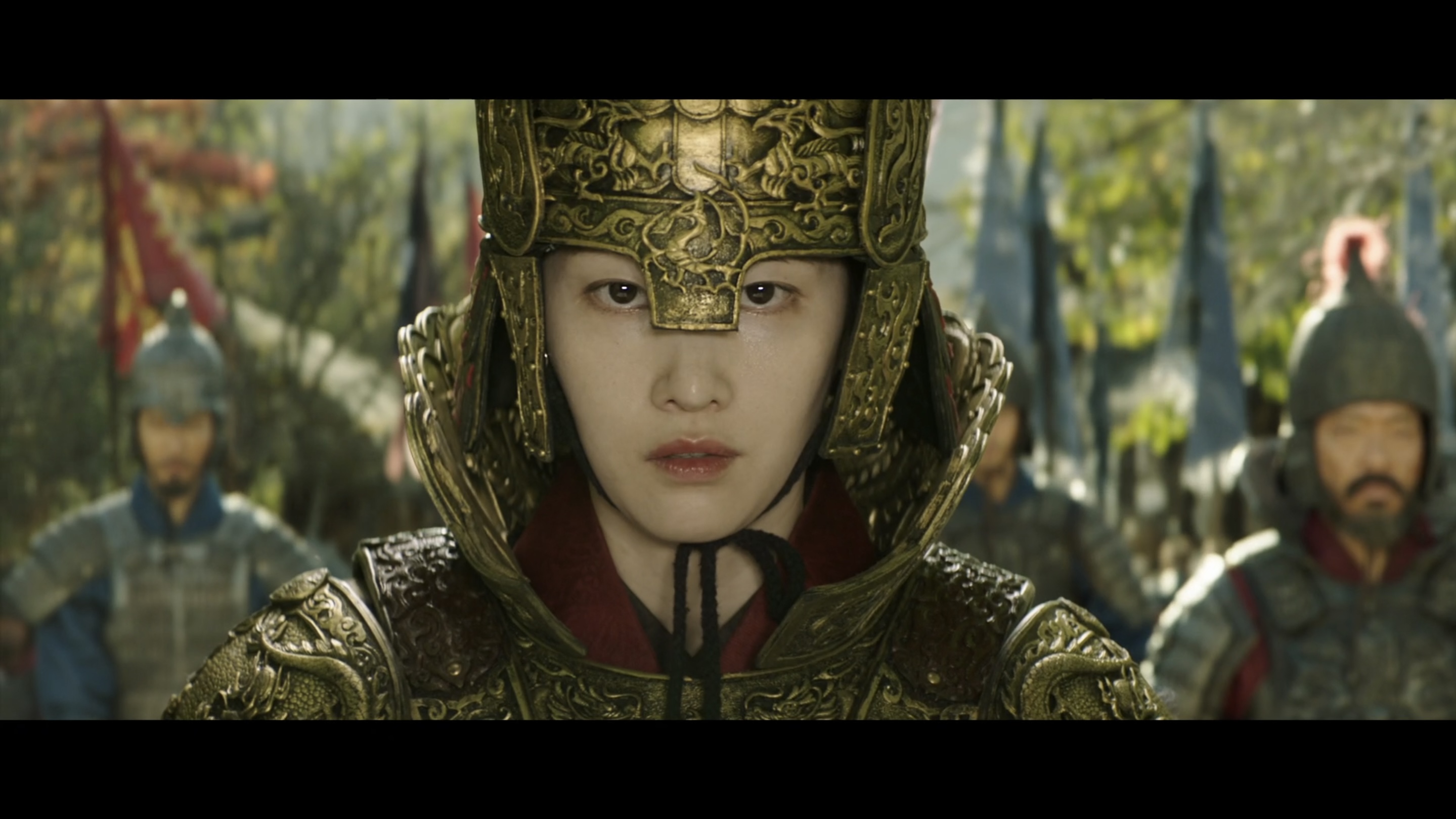
And the drama ends right there. No payoff, no answers, nothing — just an eight-hour preamble that probably hoped to end on a grandiose scene, only to peter out along the way. Queen Woo attempted to reel in viewers with a shocking and sensationalized first half, only to flounder in its second half. Open endings that leave off on a climactic point can be effective and impactful — given a cohesive build up and sufficient investment in the characters’ journey. Not when the narrative meanders its way to a half-finished conclusion while dragging the frayed halves of its incomplete plot threads behind it.
Who poisoned the king? Who ordered the hit on Sabi? What are the Chief Priest’s true motives? How will the (anti)climactic battle end? Well, that last question can be answered by the history books, but that defeats the point of watching everything before it in drama form. Queen Woo failed to make the most of its medium, relying instead on superfluous action to fill the yawning gaps of its scant substance.
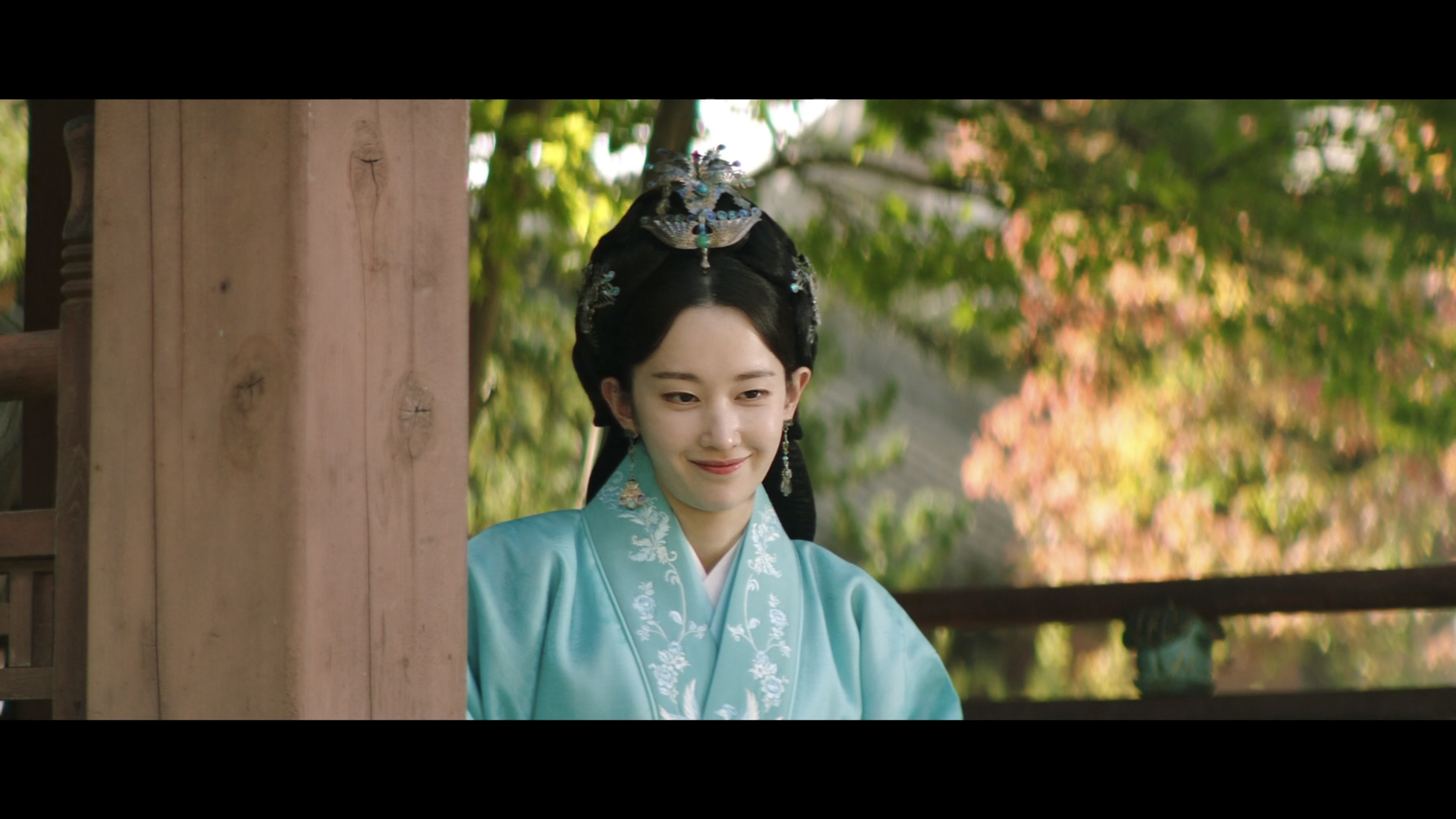
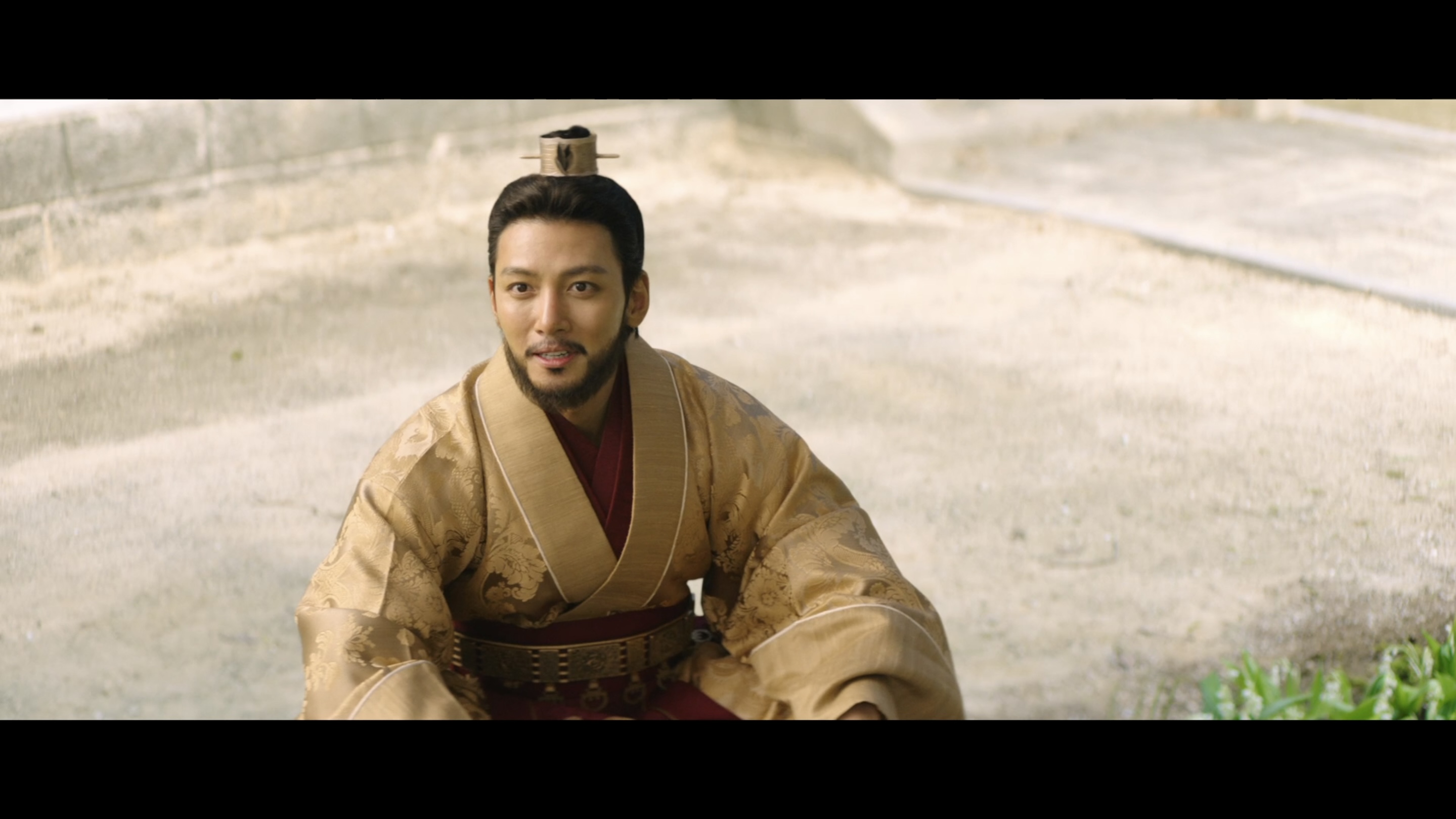
The wasted potential is such a shame, because there’s so much of it. The bond between Go Nam-mu, Woo Hee, and Eul Pa-so was perhaps the most compelling part of the show — their unmatched intellect, their staunch beliefs, and their childhood connection — yet it languished merely in brief flashbacks.
Eul Pa-so’s line to Woo Hee, after realizing she’d deliberately lost chess games to Go Nam-mu, stands out: “Please do not play losing moves any longer.” It’s at once an affirmation of her competence, and an acknowledgement of her as an equal. One that echoes his eventual decision to renounce his vengeance and support her, demonstrated through him returning her childhood daenggi he’d kept all this time.
As for our royal couple, all their wistful flashbacks paint a tragic tale of true love torn apart by political maneuvering. Whether it’s Go Nam-mu planting a plot of flowers that hark back to the color Woo Hee wore on their first meeting, or stationing the loyal Mil-woo by her side to keep her safe, or tenderly calling out for his “Hee-ya” when seeing her face instead of Woo Sun’s — there was so much of the king’s love packed into such fleeting scenes.
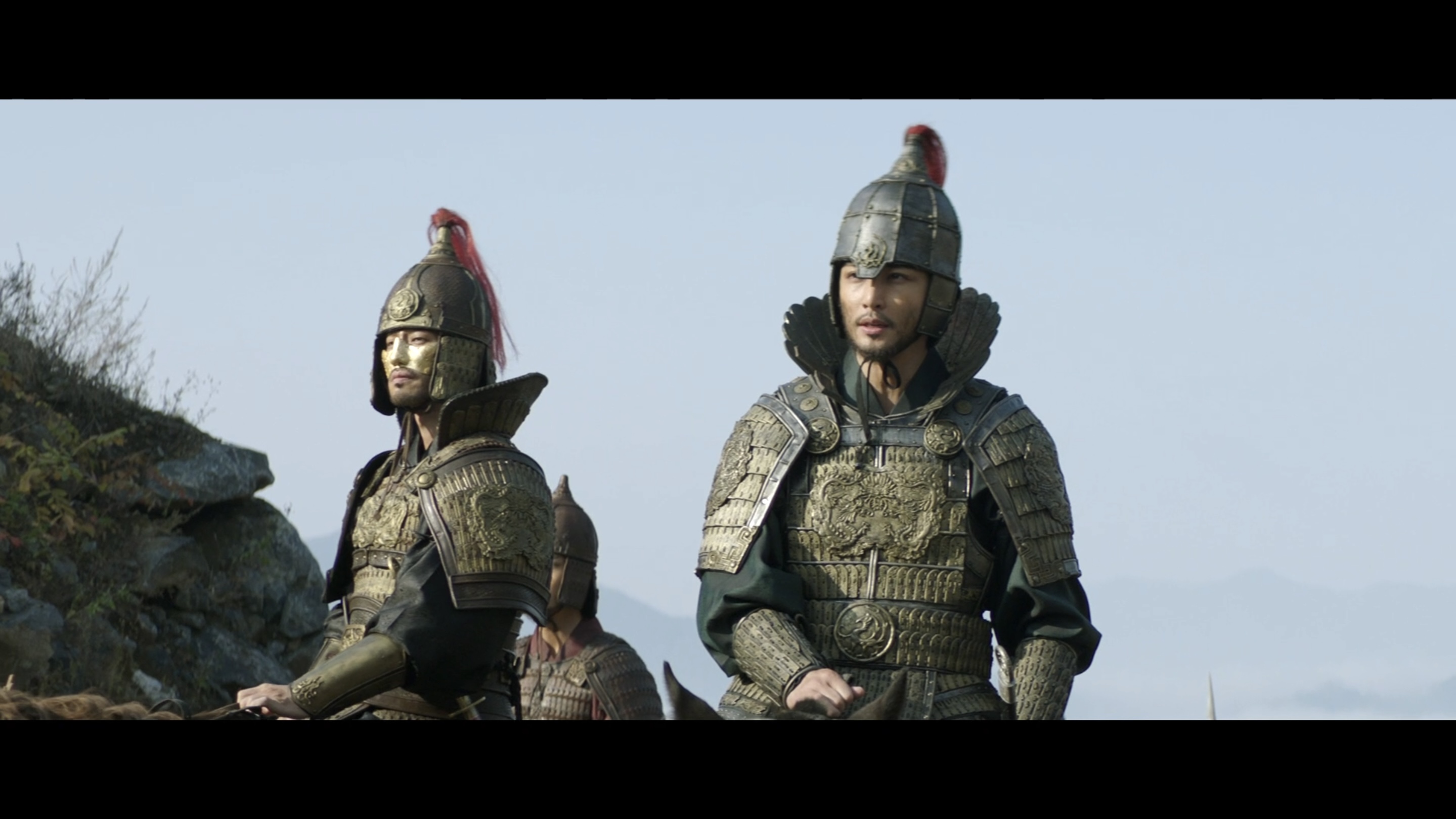
But these character beats are few and far between, and it does feel like grasping at straws. All of the royal brothers were underutilized, many characters were reduced to one-note tropes, and time could have been better spent delving into character relationships instead of drawing out scenes unnecessarily. Woo Hee is the center of the show, yet we rarely get a glimpse into her thoughts. The capable actors were the main saving grace, but even good performances alone cannot save a sinking ship of poor writing and loose directing.
At the end of the day, I’m still not quite sure what Queen Woo wanted to be — a titillating thriller? An exploration of an intriguing period in Korean history? A tribute to a strong woman who empowered herself? In trying to tick off too many boxes at once, this drama failed to establish a clear direction, leaving its fractured narrative falling flat.
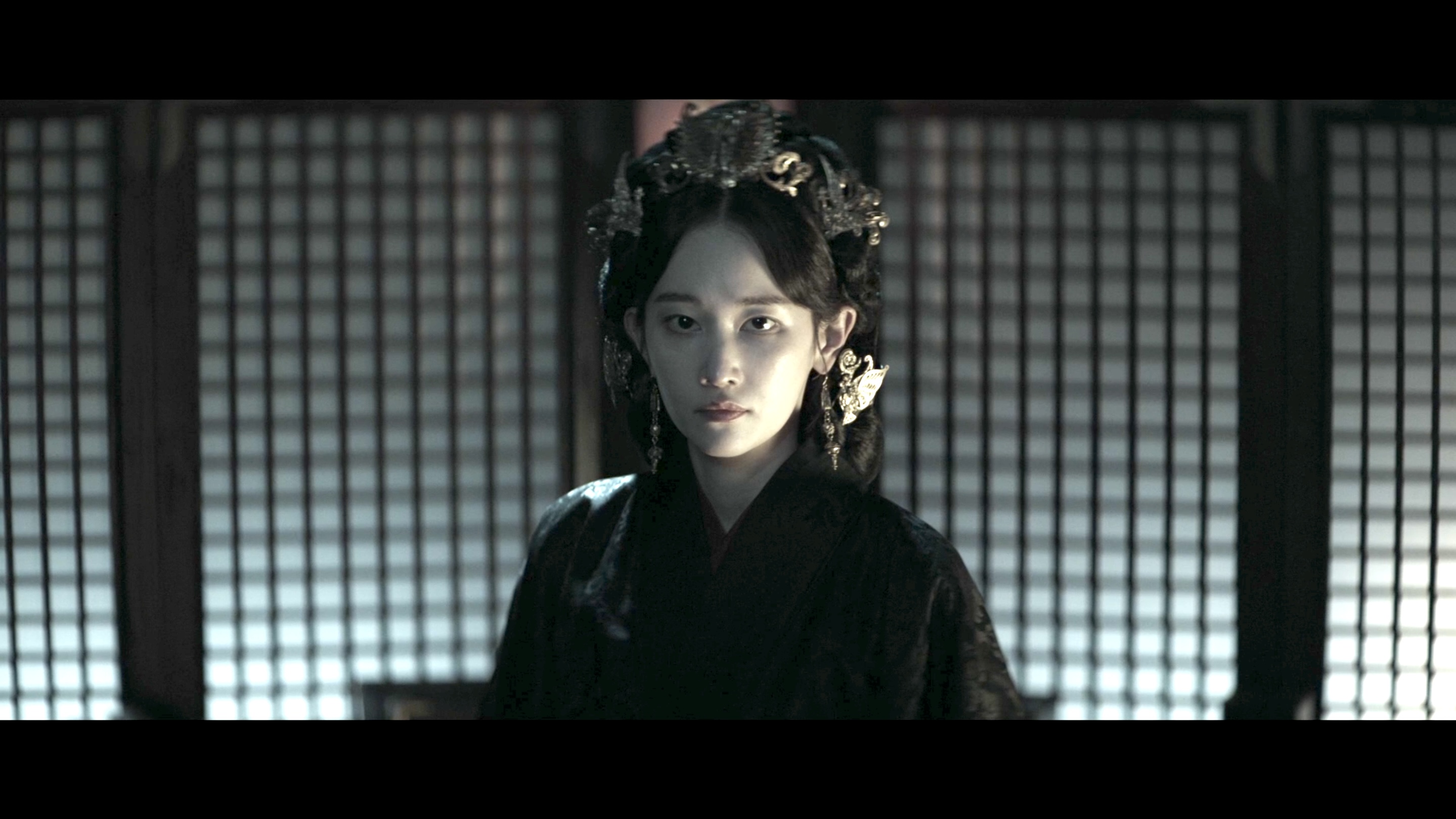
RELATED POSTS
Tags: Jeon Jong-seo, Ji Chang-wook, Jung Yumi (2), Kang Young-seok, Kim Mu-yeol, Lee Soo-hyuk, Park Ji-hwan, Queen Woo

![[2024 Year in Review] Bean of Squee](https://d263ao8qih4miy.cloudfront.net/wp-content/uploads/2023/11/beanofsquee.png)
![[K-Movie Night] A Year-End Medley](https://d263ao8qih4miy.cloudfront.net/wp-content/uploads/2024/12/YearEndMedley_1-scaled.jpg)

![[2024 Year in review] Actors bringing their A-game](https://d263ao8qih4miy.cloudfront.net/wp-content/uploads/2024/11/Jeongnyeon1112-00182.jpg)


![[2024 Year in Review] Beanie Awards](https://d263ao8qih4miy.cloudfront.net/wp-content/uploads/2024/12/beanieawards_2024.jpg)


Required fields are marked *
Your email address will not be published. Required fields are marked *
1 Lord Cobol (Kdramas, like water, flow downhill)
September 14, 2024 at 5:22 PM
So years ago someone set up some ropes holding a zillion rocks in place so cutting the ropes = landslide.
Did he assign people to inspect those ropes and replace any that seemed to be rotting?
Travelers along that road must have seen all those ropes. Did anyone ever wonder what they were for and look up to inspect the cliff? Get curious about what would happen if he cut one or pulled on one? Decide to swipe a few because he needed some rope for something?
Sigh. All this silliness just to set up a dramatic landslide that we couldn't see anyway because the lights were off.
Required fields are marked *
Minnie🫘👩🏻🚀Pioneer and Teacher 👩🏻🏫🌱🏹
September 14, 2024 at 5:39 PM
🤣🤣🤣🤣🤣
Required fields are marked *
Diana Hansen
September 15, 2024 at 11:01 AM
Looks like I am one glad little beanie to have missed watching this one. The only one I missed wanting to see was Ji Chang Wook and he was gone before you missed him I guess.
Required fields are marked *
Gikata
September 15, 2024 at 12:31 PM
Well, no, he's actually quite present even post-mortem through flashbacks.
Required fields are marked *
kiara
September 15, 2024 at 1:19 PM
Goguryeo were sun-worshipping people. Everything from the king's costumes to the flag, founding myth, and so on was a symbol of the sun. This is the only Goguryeo drama where it's always dark and gloomy.
Required fields are marked *
2 Minnie🫘👩🏻🚀Pioneer and Teacher 👩🏻🏫🌱🏹
September 14, 2024 at 5:39 PM
Weak prince....duh! She chose to be buried next to him and not the love of her life.
So much waste.
Required fields are marked *
Bunny Sonaki
September 14, 2024 at 8:28 PM
That is the exact point I am curious about. Why on earth did she make that decision?
Required fields are marked *
wapz
September 15, 2024 at 3:24 AM
I read one interpretation that she did that because due to the levirate marriage she was ashamed to face her first husband even in death. Not because she loved the second husband, but that could be wrong.
Required fields are marked *
Gikata
September 15, 2024 at 4:45 AM
Yeah, and apparently late Go Nammu haunted some unlucky scholar's dream to be VERY salty about the fact))) Which to me reads as a post factum attempt to whitewash her reputation in the eyes of future generations.
Required fields are marked *
wapz
September 15, 2024 at 4:56 AM
Yeah makes more sense.
kiara
September 15, 2024 at 6:14 AM
She is the only queen in the entire history of Korea to serve as a consort twice. Her life wasn't in danger, as the drama made it out to be. She wanted to retain her power since she had no child to take the throne.
Go Nammu was a great king who gathered his people's needs with Eul Paso's help. Goguryeo was on offense, expanding its territory under his rule.
We have a love story since this is a drama, but I'm not sure how much of it is true, as she turned around and married her brother-in-law as soon as Nammu died.
She is seen as a villain for causing the brothers' fight over the throne, which left Goguryeo weak and losing some of its territories.
I guess it makes sense that she would be ashamed to be buried next to the husband that she somehow betrayed.
On the other hand, she retained her status as queen for another 30 years because she fought for it.
Required fields are marked *
Minnie🫘👩🏻🚀Pioneer and Teacher 👩🏻🏫🌱🏹
September 15, 2024 at 6:34 AM
The fact that she tried to kill the woman who her second husband slept with but didn't because that woman was pregnant tells me that the second marriage was probably driven by more than just the power of the throne. That woman also became a concubine later on.
kiara
September 15, 2024 at 7:39 AM
She didn't because the soldiers refused to kill her, seeing that she was pregnant with the king's child.
I didn't mean she betrayed Nammu because she loved Yeonu. Marrying his brother was an act of betrayal even though leverage marriage was legally acceptable. Gyesu would not have done it as he was loyal to Nammu.
Any woman who bears the king's child becomes a concubine. Queen Woo would have to accept it, whether she wanted to or not.
Gikata
September 15, 2024 at 9:06 AM
To be fair, it's not like remaining bros WOULDN'T fight over the conveniently vacant throne without her interference, right? Perhaps re-marriage idea did add some fuel to it, but fire was already there.
@minniegupta1 I'm also skeptical over the whole 2nd hubby's pregnant concubine story - we'll never know whether Queen's anger at the woman was caused by romantic jealousy or simply fear of losing her position now that someone else managed to do what she couldn't.
kiara
September 15, 2024 at 10:42 AM
@gikata,
I'm not sure; there was no indication that the brothers didn't get along. She intentionally concealed the king's death from Balgi and instead told Yeonu like it happened in the drama. She was playing kingmaker to her advantage.
What if Balgi rejected her first since he was next in line and would ascend the throne whether she was part of the equation or not?
It would be a classic example of winner wrote the history. Who knows if Balgi was as evil as he's made out to be? He was the loser.
On the other hand, she outsmarts everyone into getting a 2nd term. She becomes the villain from the perspective of the Confucian scholar who wrote the history.
Probably both. It's understandable that she would fear losing what she worked hard to achieve and be jealous of not being the one to produce the heir to the throne.
Minnie🫘👩🏻🚀Pioneer and Teacher 👩🏻🏫🌱🏹
September 15, 2024 at 11:46 AM
That's the other part I didn't understand:
Balgi was already next in line;
So why would he kill his wife to marry Queen Woo? He would get the throne anyway, AND marry the Queen if he so wanted.
I understand about the Crown Prince though and why he revolted.
Gikata
September 15, 2024 at 12:19 PM
@kiara they may have gotten along when Nammu was still alive and young/healthy enough to have sons of his own that would inherit throne from him, thus nipping any potential temptation in the bud. But once he died it was a fair game for everyone else, even if Balgi was the most likely candidate at first.
Oh, he most certainly wasn't THIS nefarious, or he'd never lose))) As for potentially rejecting her... again, possible, but a smart order of actions would be to jump at the opportunity first and THEN deal with her discreetly if she was not to his personal liking for some reason.
@minniegupta1 because Crown Prince, firstborn, was still alive, even if disfigured and exiled? Not to mention other potential competitors. Balgi was next in line TEMPORARILY and unofficially while Nammu remained childless - never legally proclaimed an heir, at least in the drama version. When asked "who will be next?" different characters named both him and ex-CP more or less equally, meaning it wasn't a done deal at all.
kiara
September 15, 2024 at 12:58 PM
I have to give it to Queen Woo. She made the impossible possible!
3 wapz
September 15, 2024 at 5:06 AM
Thanks for the review solstices and suffering the show with us. I agree with almost everything you wrote especially the fill in the blanks with the history part. What is the purpose of watching a historical show when it's not even written narratively as a proper show. But I'll have to disagree that the acting was good. The actors who are good everywhere else were also pretty bad here. JJS was misfit for the role, from her posture to her gait, and her tone. I know what they were trying to say that she wasn't well bersed in noble etiquettes as her sister but this was taken too far that she didn't even look like a Queen standing still. And she is not yet ready for a sageuk, she especially looked bland in comparison to JCW who imo was the only good thing about this show. Song Jae Rim was so animated, LSH too has done better work in other shows, and the same goes for KMY. So many secondary characters were meh. This tells me they were all directed to act this way and that's where my biggest issue with this show lies, the director. He tried but I think the writing didn't help either. I would rather watch a show about Go Nammu and Woo Hee's love story which I think had a lot of potential (provided JCW remains and JJS is replaced), than this. It's a pity because this wasn't a Joseaon sageuk in ages, and the historical context was so rich but it all came down to a chase. Also I would like to know if South koreans have no issue with the portrayal of Yeon Woo/Sansang? Isn't he a liked King too? I thought his portrayal was somewhat disrespectful. Joseon exorcist was probably banned for less.
Required fields are marked *
Minnie🫘👩🏻🚀Pioneer and Teacher 👩🏻🏫🌱🏹
September 15, 2024 at 6:37 AM
I can't find a lot on Sansang, but he is said to be the one who crushed the rebellion of his brothers and was well liked. But then there are some that say histoians think Sansang and Bal Gi are same people.
Required fields are marked *
kiara
September 15, 2024 at 8:14 AM
Sansang tasked his brother Gye-su with quelling the rebellion. The initial battle in episode 1 was also Gye-su, but Nammu later joined him. Gye-su appears to be devoted to his brothers and his country.
The history of the Three Kingdoms was compiled in 1145 during the Goryeo era. This drama is set in 179, so there are errors, especially regarding King Sindae's sons. In the official records, Samguk Sagi and Balgi are the names of Sindae's first and third sons. That's why historians believed it was an error. Some say that the king had only four sons; Balgi was the third son, while others believe he was the oldest and Nammu was chosen over him.
Required fields are marked *
kiara
September 15, 2024 at 8:20 AM
Er " In the official records, Samguk Sagi, Balgi is the name of Sindae's first and third sons."
Required fields are marked *
Minnie🫘👩🏻🚀Pioneer and Teacher 👩🏻🏫🌱🏹
September 15, 2024 at 8:33 AM
Ah! Thanks so much. yes, it makes sense.
Nothing like a distorted drama series presenting an already distorted history with a Queen who looked like she is time travelling from 2024.
Required fields are marked *
kiara
September 15, 2024 at 11:24 AM
Which makes speculating fun. 😄
Healer’s
September 15, 2024 at 7:52 PM
🤣🤣
kiara
September 15, 2024 at 8:18 AM
Comment was deleted
Required fields are marked *
Peridot
September 15, 2024 at 8:21 AM
I felt bad for focusing on her gait so much, but it also really bothered me. There was no royal grace to it at all, and it had the effect of distracting me too much.
I do wonder at the portrayal of the fourth prince as well.
Required fields are marked *
kiara
September 15, 2024 at 11:58 AM
The 5 tribes, their roles, and the transitions between the ruling clans is unclear.
At this point, Goguryeo was a state, not yet a full-fledged kingdom, currently ruled by the "Go" clan of the Gyeru tribe.
The first king of Goguryeo, Chumo, aka Jumong, is said to be the son of "Hae" Mosu from Northern Boyeo. When he became king of Goguryeo, he changed his name from "Hae" to "Go." When his son Yuri became the second king of Goguryeo, he kept his original name, "Hae." The Hae clan is said to be of the Sono (Sunno), aka Sonobu tribe (West District). The Go clan of the Gyeru tribe ruled till the end of Goguryeo. (It's confusing since they were father and son and should be from the same tribe).
The 6th king, Taejo, aka Taejodae, changed the ruling clan back to "Go." Taejo then centralized the sovereign power into 5 districts, which is why we have Northern, Southern, Eastern, Western, and Central tribes in this drama instead of the original names.
The queen's clan belonged to the Yeonnabu tribe (the Northern District in this drama) and was responsible for providing a queen for the king.
I believe that young women from this tribe would have been trained for the position from a young age, and Queen Woo would have been more graceful than the one we see on screen.
Required fields are marked *
Gikata
September 15, 2024 at 12:28 PM
Even if she herself wasn't expected to aim for the Queen position initially and thus lacked proper training from the start, surely that would've been fixed during 10+ years of their royal marriage.
Required fields are marked *
kiara
September 15, 2024 at 12:37 PM
That's probably why the writer created the fictional older sister, to be the one aiming for the queen's position, and made Queen Woo the tomboy who wanted to be a general.
Gikata
September 15, 2024 at 1:16 PM
@kiara yeah, "not like other girls" syndrome was strong with this one^^
kiara
September 16, 2024 at 5:56 AM
@gikata,
Warrior queen leading and calling the shots on the battlefield. Please 🙄
That would be more fitting for the first queen of Goguryeo, Queen Soseono.
https://world.kbs.co.kr/service/contents_view.htm?lang=e&menu_cate=history&id=&board_seq=61200&page=4&board_code=korean_story
kiara
September 16, 2024 at 8:54 AM
“When the king (Jumong) fled to this region (Jolbon Buyeo) to escape disaster, our mother (Soseono) used her own property to assist him in founding a new kingdom. Despite her efforts and dedication, the kingdom now belongs to Yuri and we are nothing but a pain in the neck, as the king has died. We’d rather move south with our mother and choose a proper land to create another kingdom.”
This is why Yeon Bi and the Jolbon tribe in this drama referred to their land as stolen by Chumo, aka Jumong.
Gikata
September 16, 2024 at 9:42 AM
@kiara very jerk move of Jumong, tbh, her descendants had all the rights to be unhappy with situation.
kiara
September 16, 2024 at 9:54 AM
@gikata
This writer used Yuri's sword as a means to unite all the tribes as if the Jolbon tribes gave a shit about Yuri. He just showed up and ruled a country that was established on Jolbon lands by the Jolbon people.
Gikata
September 16, 2024 at 12:35 PM
@kiara maybe writer is proud Go clan descendant or something?)))
Peridot
September 16, 2024 at 2:30 PM
Thank you for the extra context. :)
Required fields are marked *
4 Kafiyah Bello
September 15, 2024 at 7:34 AM
MEH....SIGH
Required fields are marked *
5 Peridot
September 15, 2024 at 8:25 AM
Maybe instead of long scenes of the Queen and her entourage running through the woods to escape their pursuers, we could have been shown more flashbacks to help flesh out characters and their relationships to one another.
I couldn’t help but feel bored for most of the second half. I also wish our lead actress could have displayed more depth and subtlety in her performance.
Required fields are marked *
6 Unaspirated
September 16, 2024 at 9:30 AM
I did not watch this but I appreciate your recap and review @solstices !
On the plus side, that royal blue robe looks amazing!
Required fields are marked *
7 spazmo
September 16, 2024 at 2:29 PM
why was i seeing Queen Woo Pt 2 listed on the side bar previously? i thought there was going to be 8 more episodes... that was the end?
Required fields are marked *